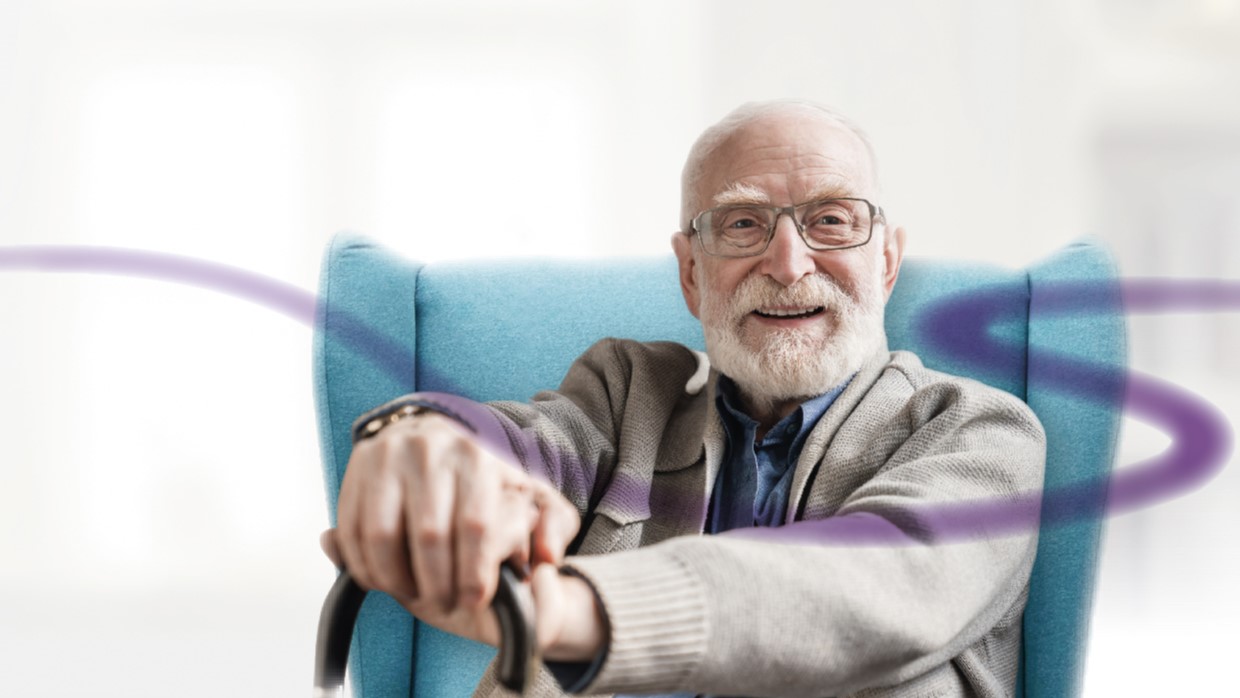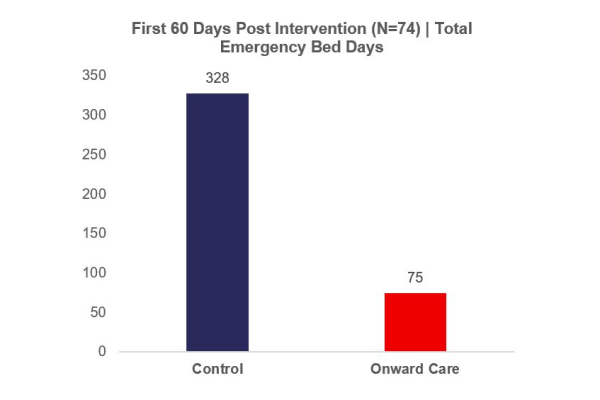
Onward Care - freeing up beds, addressing health inequalities
Bed capacity is a major constraint across health care systems, impacting on A&E performance, ambulance waits and elective backlogs; patient experience, outcomes and staff morale. All of this is exacerbated by delayed discharges for those medically fit and by health inequalities.
Challenges in mobilising social packages of care are well known and should continue to be a point of focus, however, Sodexo Health & Care has developed, and is delivering, a solution with Buckinghamshire Healthcare NHS Trust that helps unblock discharge pathways and reduces unplanned hospital readmissions.
Frail, elderly patients make up a significant proportion of medically fit for discharge patients, however without suitable community support, the long-term outcomes are often poor:
- 40% of moderately frail patients are admitted to hospital within 6 months of discharge, rising to 55% for severe frailty¹
- Length of stay for these people once admitted can be reduced by 70%² with proactive support
Delivering non-clinical, non-social care support at a lower cost and faster pace can address these outcomes, freeing up bed capacity across a system.
Challenging the continuum of care
Unplanned hospital admissions, especially for frail, elderly patients, leads to further challenges. Patients typically lose 15% of their strength for every 10 days they’re in hospital3, they become more institutionalised, need more support post discharge and lose their independence. They often become socially isolated and lonely and this is directly correlated with life expectance4.
As a result, packages of care become more complex, causing medically fit discharge delays - contributing to the 15,0005 patients in hospital beds daily who could otherwise be at home.
Social prescribing is a move in the right direction, but most community services still focus on reactive clinical support (HIIT teams, D2A, Virtual Wards to name a few) and social home care focuses on activities of daily living. This gap, reactive to proactive, clinical to holistic, represents a clear opportunity for rapid impact, building on existing services and infrastructure.
A new perspective to improve bed capacity
Working in partnership with Buckinghamshire Healthcare NHS Trust, Sodexo Health & Care has developed a unique 12-week service that combines face-to-face and telephone support for frail patients discharged to their own homes. Delivering data-driven targeted secondary and tertiary prevention interventions for immediate impact.
Patients are encouraged to set three goals of their own and we identify local charities to assist in achieving these ambitions. Our weekly telephone calls and targeted face-to-face visits assess progress and provide encouragement and support, developing self-confidence while reducing social isolation and loneliness.
Onward Care has shown how non-clinical teams can support the people of Buckinghamshire in a way that improves their quality of life and frees up capacity in hospitals. Working in partnership like this to address the challenges we face is a crucial part of the future for our Trust.
Passive remote monitoring
Through passive, non-clinical, remote monitoring we can measure movement and use of the kettle and fridge – a proxy for hydration and nutrition.
Using artificial intelligence, the system learns a patient’s routine and can flag any abnormalities – providing an early indication of potential deterioration in health which, if left untreated, might result in a hospital admission. The data produced also shows users their progress over the 12 weeks - having a considerable impact on a patient’s self-confidence and motivation.
Carol’s story
Before
Carol, 84, with respiratory disease (COPD) and diabetes, lived alone and was still shielding post-COVID-19. She couldn’t make her Wi-Fi work, was in debt, had lost touch with her brother and also with her GP. Carol rarely talked to anyone, neglected herself, and was became weaker. Facing a spial of challenges she felt isolated and lacked confidence.
When her COPD worsened, she called an ambulance, leading to her 6th unplanned hospital admission in 8 months.
After
Carol is enrolled onto Onward Care. She tells the team what is important to her. Initially she wants help with her Wi-Fi and to manage her debts. We find charitable support and having these aspects more under control gives Carol the confidence to get back in touch with her brother.
She likes knitting and we find a local knit and natter club. She is nervous initially, so we discuss it with her several times and now she goes weekly and has regular calls with the new friends that she has made.
Data from the remote monitoring sensors in her flat shows that she is becoming more mobile. Even when she’s having a bad day she sees that overall she is improving.
Carol has regained a level of independence she hadn’t had for years. When she next becomes ill, she calls her GP and is seen immediately and treated earlier. She no longer requires hospital admission several times each year.
Carol’s feedback to us
"The Onward Care Team are there if I need them… The signposting support has helped me to get control of dealing with the various services and applications I need to access help..."
Targeting resources for maximum impact
Sodexo’s predictive risk tool uses hospital data to identify the patients at highest risk of future readmission – and determines where our community interventions could make a tangible difference to the outcome.
We work alongside the clinical teams, the patient and their family to develop home support plans and solutions that address a patient’s unique circumstances.
Outstanding outcomes and reduced health inequalities
As well as several tangible benefits for the Trust, the service has a major impact on self-confidence, social isolation and loneliness – which is a significant issue for many frail and less mobile patients. With 91% of patients saying they would recommend the service to friends and family.

Fig. 1
At Stoke Mandeville Hospital, we’ve seen a 77% reduction in beds used compared to a matched control group (fig. 1). This has been delivered by impacting in two areas (table 1):

Table 1
1) reduction in readmissions for those supported- the service successfully helps patients regain their independence so that they are more able to self-care at home.
2) marked length of stay reduction in those that are admitted - we have had the time to work proactively with patients to put in place holistic, bio-psycho-social support whilst at home. For those that are later admitted, discharge is much faster because the support they need is in place and they feel confident to be discharged.
The case load has twice the level of social deprivation in comparison to the control group and 5x that of an average unplanned hospital admission. The impact on health inequalities is marked.
The service has also provided the Trust a return on investment of 35% - based on the cost of a hospital bed, which rises to 83% when those beds are used for additional elective activity.
The feedback received from both patients and staff has been incredible, with senior staff describing it as the glue between existing hospital and community services.
As a result of the outcomes delivered the service has been running successfully at Stoke Mandeville for almost 18 months.
Patients often go home with a gap in their care and it’s filling that gap. I definitely feel more confident discharging patients knowing that Onward Care is there.
A sustainable workforce model
The service uses a non-clinical workforce model unconstrained by resource pressures in the clinical or social care sectors. Recruiting motivated individuals to do rewarding work that is flexible is a real advantage. Staff can be trained quickly with regular audits by a senior nurse to ensure quality standards are maintained.
Scaling up across the NHS
Delivering an alternative service solution that tackles the gap between reactive clinical support and social home care, at low cost and at a fast pace, provides significant benefits for Trusts and Systems struggling with bed capacity and delayed discharges:
- 35% return on investment (based on bed day cost) rising to 83% if backfilled with additional elective care.
- Addressing health inequalities – supporting a patient cohort with high levels of social deprivation.
- A 77% reduction in use of beds for the frail patients we support.
- Addressing self-confidence and independence of service users – improving quality of life every day.
To find out more about how quickly Onward Care can be mobilised for your Trust or System, contact Adrian McCourt: onwardcare@sodexo.com